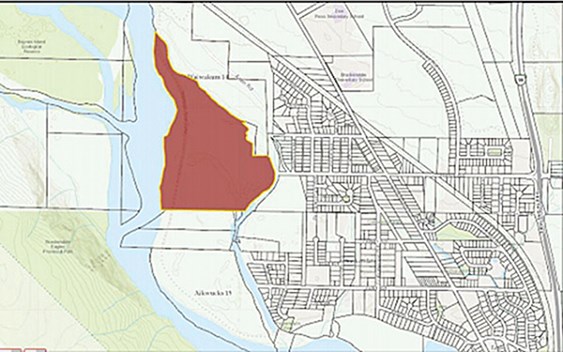The B.C. Supreme Court has struck down several claims a local landowner made against the District of Squamish and the province.
In her written reasons for judgment, Justice Heather MacNaughton dismissed some allegations presented in two lawsuits filed by numbered company 0742848 B.C. Ltd. as an “abuse of the court’s process.”
Donald McCargar is the principal of 0742848 B.C. Ltd.
He made submissions and appeared in court on behalf of the company.
The legal actions are related to the company’s attempts to subdivide and develop its 78.5-acre property, which is located in or near Brackendale by the Squamish River.
The lawsuits from McCargar included damage claims for profits he hoped to earn from developing and selling residential lots on his property.
McCargar’s land is divided by the Brackendale Dike.
McCargar’s complaints, as summarized in MacNaughton’s judgement, stem from events that began in 2008.
MacNaughton’s written summary says the inspector of dikes told the District of Squamish to place material on the Squamish River side of the dike, and the municipality followed those directions.
In 2009, McCargar applied to Squamish for a development permit for his property, but the municipality refused the application.
Two years later, McCargar sought a judicial review, and Justice Frits Verhoeven compelled the District to give McCargar a development permit.
In 2013, the Ministry of Environment issued a stop-work order on the property.
Later that year, the District of Squamish also issued a stop-work order preventing McCargar from continuing development on his property.
In 2016, McCargar applied for a building permit to place a modular home on the property, but the District denied the application, saying he needed to have permission from the Ministry of Environment.
There were two sets of allegations in this case, with one set directed at the District of Squamish and its staff, and the second set directed towards the Ministry of Environment and provincial staff.
With respect to the allegations directed at the municipality, the court document said that McCargar accused the District of trying to artificially devalue his property in order to expropriate it cheaply as a park.
Further, he alleged the person who was then in charge of approving development applications, Corien Speaker — also known as Corien Becker — “acted in bad faith and without valid cause.”
Speaker previously served as chief administrative officer for the District.
McCargar, however, doesn’t name Speaker as a defendant in the dispute.
Instead, he claims the current District staffer in this role, Gary Buxton, is responsible for the issue because he is “liable for...Speaker’s conduct” and “continues to act in bad faith by maintaining [the rejection of the subdivision application],” the judgement says.
Buxton currently works as a general manager for the District.
However, MacNaughton noted that the District said Buxton does not have the authority to interfere with Speaker’s past decision.
She wrote that the Squamish defendants said Buxton can’t act in bad faith by failing to do something he has no authority to do.
“[McCargar’s] pleading discloses no reasonable claim, is bound to fail, and should be struck,” said MacNaughton. “[Buxton] is not...Speaker’s employer or principal. As a result, there is no legal basis on which..Buxton can be held vicariously liable for...Speaker’s decisions or acts.”
MacNaughton also said McCargar raised allegations against the District and its associated staff that should be struck as “an abuse of process.”
In her judgement, she noted a past case dealing with what is known as “collateral attack.”
“If a party could avoid the consequences of an order issued against it by going to another forum, this would undermine the integrity of the justice system,” she said, quoting a 2010 case called Canada v. TeleZone Inc.
She noted that McCargar did not file an appeal under the Land Title Act, nor did he file for a judicial review. Instead, he opted to file lawsuits.
“It was open to [McCargar] to appeal...Speaker’s decision within the time limits set out in the [Land Title Act], or to seek a timely judicial review of it,” MacNaughton said. “Further, it is always open to [McCargar] to make a new subdivision application for consideration by...Buxton or any successor in the office of the [approving officer] in Squamish.”
With respect to the allegations brought against the province, MacNaughton wrote that provincial authorities say that McCargar deposited fill against the dike for a fill pad, put a house on the fill pad and started to develop a road on the dike.
MacNaughton added that the province said McCargar hadn’t received a development permit from Squamish or approval from the inspector of dikes to place a fill pad against the dike, install utilities or services for a house, or to build a road on the dike.
The deputy inspector of dikes agreed in principle to the location and use of a fill pad, but not to placing the pad against the dike, which would eliminate the setback, MacNaughton said.
McCargar had previously applied to placing the fill pad against the dike, but was denied.
He also complained that the District’s installation of rip-rap on the dike made it difficult to build a house.
“[McCargar pled] conclusory statements but not any facts to support deliberate unlawful conduct on the part of the inspector or the ministry in the exercise of their public functions,” MacNaughton said.
MacNaughton struck down claims against the ministry and inspector for damages for misfeasance in public office, contempt, trespass and unlawful expropriation.




